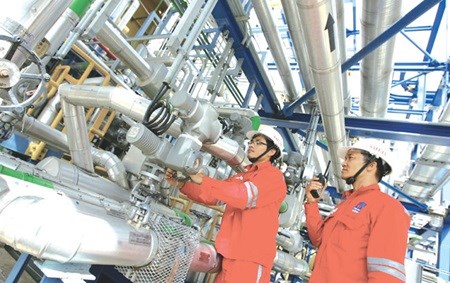
The Government has issued regulations on further tightening the supervision on State capital directed into enterprises, in a move to assure investments are increasingly effective.
The Government has issued regulations on further tightening the supervision on State capital directed into enterprises, in a move to assure investments are increasingly effective.
Under Decree 87/2015/ND-CP issued last week, the Government will provide financial supervision, performance evaluations, and disclosures of financial information of enterprises, in a bid to quickly resolve difficulties faced by firms and encourage them to complete business plans.
 |
| Workers at Nhon Trach 2 Power Plant in Dong Nai province. |
The move is expected to improve the performance of State-owned enterprises (SoEs), especially when the Government is speeding the equitisation and divestment of State capital at SoEs.
Currently, there are also regulations on supervising SoEs, however, they remain inadequate and loosely enforced, especially in the disclosure of firms' financial information.
Deputy Director of the Ministry of Finance's Corporate Financial Department, Dang Quyet Tien, said there remained restrictions on disclosures of financial information among SoEs. As of August 31, 2014, only 76.9 percent of State-owned corporations and groups had mapped out their financial supervision reports.
Under the decree, the Ministry of Finance (MoF) has been asked to coordinate with other ministries and agencies to take over supervision, which must also comply with existing regulations on management and use of State capital in production and business.
The decree states that the disclosure of firms' financial information will be made public on a regular basis based upon six-month and one-year audited financial reports of enterprises.
Under the new decree, the assessment of the effectiveness of the performance of firms will be based on their turnover; post-tax profits and return on equity; debt solvency; obeying legal regulations on State capital investment, management and usage; tax payments, as well as budget and social welfare contributions.
Further, state-owned firms can be placed under special monitoring when there are signs of financial problems, according to the decree.
As for investment projects, the supervision will focus on overseeing capital mobilisation sources, as well as progress in the construction of projects and disbursements.
Supervisory agencies will also monitor enterprises' investments in their subsidiaries and associated companies.
Further, under the Decree, the MoF is to compile a plan in the fourth quarter on supervising State capital in businesses for release before January 1, after which related ministries must comply with the plan.
Where violations are detected, the MoF must report to the Prime Minister and apply sanctions according to the law.
The finance ministry will also be required to receive and make public the enterprises' financial information on its website starting in the 2016 fiscal year.
Experts said that the new regulations were timely and meant to avoid losses of State capital, as a number of SoEs have reported losses in recent years.
Previously, due to inadequate supervision by ministries and agencies, losses were reported at a number of SoEs. For instance, Vietnam National Shipping Lines (Vinalines) lost more than 1.6 trillion VND (71.1 million USD) last year, according to the Government's website chinhphu.vn.
Phap luat thanh pho HCM (HCM City Law) newspaper quoted Dr Nguyen Chi Hai from Vietnam National University – HCM City as saying that SoEs played important roles in the economy, however, their performances were not as effective as expected.
According to Hai, although SoEs account for roughly 70 percent of the country's total investment, 60 percent of the country's credit and 70 percent of the country's official development assistance (ODA), these businesses make up only some 30 percent of the country's GDP growth and represent up to 79 percent of commercial banks' questionable debts.
(Source:VNA)




